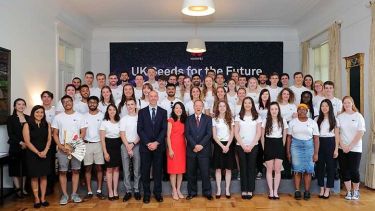
Ahead of the COP26 summit in Glasgow, a panel of experts and academics assessed higher education’s response to the climate crisis, and discussed what could be done to deliver sustainable climate action
This November, world leaders will converge in Glasgow for the 2021 United Nations Climate Change Conference (COP26). Five years on from the signing of the Paris Agreement, carbon emissions continue to rise. Expectations that COP26 might present a watershed moment for climate action remain mixed.
Nonetheless, at Times Higher Education’s 2021 UK Academic Salon, a panel argued that the conference presented an opportunity for higher education to “shine a spotlight” on the role the sector can play in addressing the climate challenges ahead. In doing so, institutions can make the case for a funding model that supports discovery-led research and offers a pathway to develop practical solutions to the climate emergency.
“I think we need to grasp this opportunity to make the point that this requires sustained investment in research, in people, the facilities, the infrastructure, and the partnerships,” said Chris Pearce, vice-principal of research at the University of Glasgow. “It is too easy to fall into a trap and believe that the solutions we need and the expertise that we need to tackle climate change and all of its consequences can suddenly materialise on demand as a result of isolated initiatives.”
Professor Pearce said that the biggest barriers to the UK achieving its net zero emissions obligation were yet to be overcome. A national programme was needed to bring discovery and application-led researchers together.
Alyssa Gilbert is the director of policy and translation at Imperial College London and chair of the COP26 universities network. Ms Gilbert believes it is a positive sign that universities are hiring more professionals from the private sector to present the benefits of research initiatives to policymakers.
“That is an indicator that universities are making more of an effort to have an impact,” Ms Gilbert said. “You need a mixture of skills to make this happen.” Academics needed support when proposing impact-led research projects, with incentives in place to encourage faculty to support such proposals. “[We] must recognise the time that academics spend on these initiatives to encourage new behaviours,” said Ms Gilbert.
Paul Bates, associate director of impact and innovation at the University of Bristol’s Cabot Institute for the Environment, argued that climate action begins on campus: universities needed to look at their own behaviours and rehabilitate carbon-inefficient buildings. “Academic travel is unsustainable,” he said. “We can’t afford to burn so much carbon.”
Professor Bates said that researchers had made great strides in tackling climate change scepticism. It was imperative, however, to pursue more research projects in low-energy technologies, carbon technologies, behavioural change and climate justice. Professor Bates welcomed the establishment of multidisciplinary research institutes across the UK. It was critical that researchers from all disciplines put their shoulders to the wheel.
“We are not going to solve the climate problem with just one group of academics alone,” he said. “It is not a science problem, or an engineering problem; we are going to have to bring all talents to bear – lawyers, psychologists, medics – to tackle this.”
Full recordings, THE’s editorial coverage and exclusive content about the 2021 UK Academic Salon are available here.
Learn more about Huawei and higher education.













































